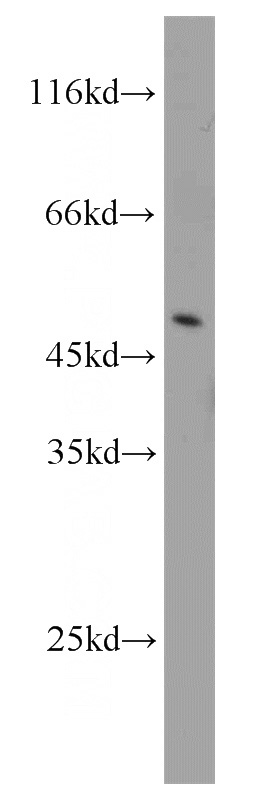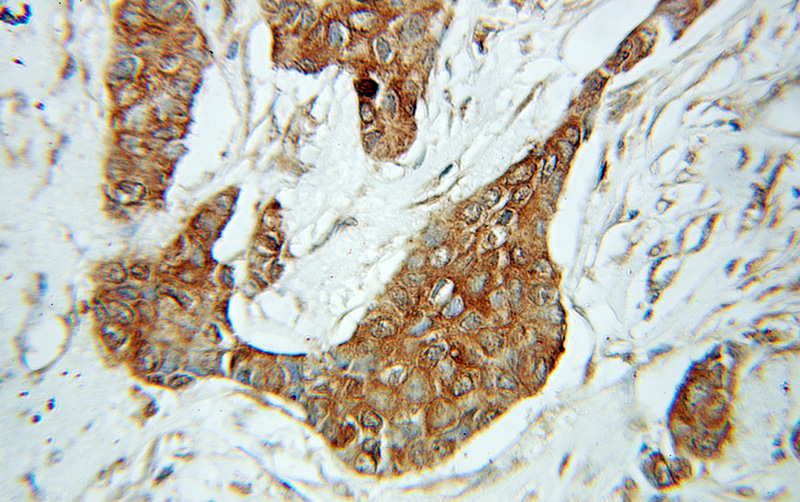-
Product Name
AHCY antibody
- Documents
-
Description
AHCY Rabbit Polyclonal antibody. Positive WB detected in mouse thymus tissue, HeLa cells. Positive IHC detected in human breast cancer tissue. Observed molecular weight by Western-blot: 48 kDa
-
Tested applications
ELISA, WB, IHC
-
Species reactivity
Human,Mouse,Rat; other species not tested.
-
Alternative names
AdenosylhomOCysteinase antibody; AdoHcyase antibody; AHCY antibody; S adenosylhomOCysteine hydrolase antibody; SAHH antibody
-
Isotype
Rabbit IgG
-
Preparation
This antibody was obtained by immunization of AHCY recombinant protein (Accession Number: NM_001362750). Purification method: Antigen affinity purified.
-
Clonality
Polyclonal
-
Formulation
PBS with 0.1% sodium azide and 50% glycerol pH 7.3.
-
Storage instructions
Store at -20℃. DO NOT ALIQUOT
-
Applications
Recommended Dilution:
WB: 1:500-1:5000
IHC: 1:20-1:200
-
Validations

mouse thymus tissue were subjected to SDS PAGE followed by western blot with Catalog No:107842(AHCY antibody) at dilution of 1:1000

Immunohistochemical of paraffin-embedded human breast cancer using Catalog No:107842(AHCY antibody) at dilution of 1:100 (under 10x lens)
-
Background
AHCY, also named as SAHH, belongs to the adenosylhomocysteinase family. AHCY is a competitive inhibitor of S-adenosyl-L-methionine-dependent methyl transferase reactions; therefore AHCY may play a key role in the control of methylations via regulation of the intracellular concentration of adenosylhomocysteine. AHCY catalyzes the reversible hydrolysis of S-adenosylhomocysteine to adenosine and L-homocysteine.(PMID:21220475).
-
References
- Xiao Y, Huang W, Zhang J, Peng C, Xia M, Ling W. Increased plasma S-adenosylhomocysteine-accelerated atherosclerosis is associated with epigenetic regulation of endoplasmic reticulum stress in apoE-/- mice. Arteriosclerosis, thrombosis, and vascular biology. 35(1):60-70. 2015.
- Zhou J, Yang L, Zhong T. H19 lncRNA alters DNA methylation genome wide by regulating S-adenosylhomocysteine hydrolase. Nature communications. 6:10221. 2015.
- Coppin JF, Qu W, Waalkes MP. Interplay between cellular methyl metabolism and adaptive efflux during oncogenic transformation from chronic arsenic exposure in human cells. The Journal of biological chemistry. 283(28):19342-50. 2008.
- Li S, Arning E, Liu C. Regulation of homocysteine homeostasis through the transcriptional coactivator PGC-1alpha. American journal of physiology. Endocrinology and metabolism. 296(3):E543-8. 2009.
- Kim HJ, Kang HJ, Lee H. Identification of S100A8 and S100A9 as serological markers for colorectal cancer. Journal of proteome research. 8(3):1368-79. 2009.
- Fan J, Yan D, Teng M. Digital transcript profile analysis with aRNA-LongSAGE validates FERMT1 as a potential novel prognostic marker for colon cancer. Clinical cancer research : an official journal of the American Association for Cancer Research. 17(9):2908-18. 2011.
- Wang Y, Zhao B, Zhang S, Qu X. Characterization, expression and localization of S-adenosylhomocysteine hydrolase from amphioxus Branchiostoma belcheri tsingtaunese. Bioscience reports. 28(3):135-44. 2008.
- Li Q, Mao L, Wang R, Zhu L, Xue L. Overexpression of S-adenosylhomocysteine hydrolase (SAHH) in esophageal squamous cell carcinoma (ESCC) cell lines: effects on apoptosis, migration and adhesion of cells. Molecular biology reports. 41(4):2409-17. 2014.
Related Products / Services
Please note: All products are "FOR RESEARCH USE ONLY AND ARE NOT INTENDED FOR DIAGNOSTIC OR THERAPEUTIC USE"
